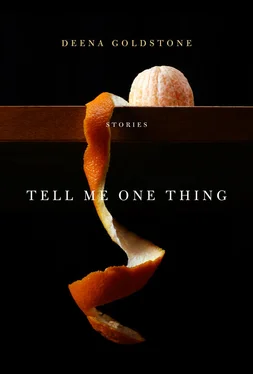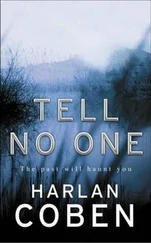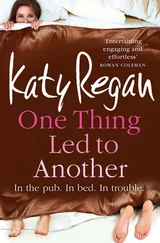She opens the first door she finds, and it is definitely one of the boys’ rooms. There are bunk beds on the far wall, complete with Spider-Man sheets, and a desk against the window with drawing supplies — Magic Markers and stickers and sheets of faintly brown drawing paper — and the requisite electronic equipment — a laptop, an iPad. There’s a wall of cubbyholes stuffed with essential boy paraphernalia (Trudy remembers them all from Carter’s childhood): a baseball mitt, a bike helmet, a terrarium that now holds pieces of Legos, a deflated basketball, a board game called Tsuro with an elaborate dragon on the lid, and a whole colony of plastic dinosaurs arranged with infinite care into groupings of like kinds. Trudy remembers Carter’s dinosaur phase, which lasted well over a year. Apparently nothing much has changed in that regard. Dinosaurs march in battalions across the wall of cubbies. What she has in front of her is a room any seven-year-old could live in happily. It tells her nothing.
She backs out and tries the room next door. This must be the younger boy’s room, Aidan’s, because there are more remnants from toddlerhood here — a couple of dirty stuffed animals sitting lopsided on top of a bookcase, a brightly colored plastic dump truck filled with tennis balls, a mural of a rainbow painted on the wall above the bed with a leprechaun at the end who looks a lot like Aidan.
Trudy is disappointed and relieved at the same time, relieved that it all looks so normal, disappointed that she hasn’t found any evidence to bolster her belief that something heinous happens in this house. If she’s going to do something, if she’s going to try to help these boys, she needs evidence. And she realizes as she steps back out of Aidan’s room and closes the door that this is exactly why she entered the house in the first place.
There’s one more door in the hallway and it’s closed. She assumes it’s the rodent’s bedroom and she’s tempted to take a look. She contemplates the door, moves toward it, her hand extended, when she hears, “What are you doing?” and she nearly jumps out of her skin.
Fred stands in the hallway, frowning.
“You scared the bejeezus out of me!” Now Trudy can be furious instead of terrified. It’s only Fred.
“You deserve it. What are you doing in here?”
“Something awful happens in this house and I need evidence.” This is said as righteously as Trudy can manage.
Fred doesn’t even answer her. He takes her by the upper arm — she looks down in astonishment at his hand on her biceps — and leads her out, through the living room, the front door, and onto the porch. Next he takes the package from her hands and puts it down on the Doyles’ doorstep. Then he marches her smartly and quickly down the driveway, his grip on her arm tight and insistent.
“There,” he says as he deposits her on her own front porch. In his mind the matter is finished. He turns to the sawhorse he set up that morning and begins to prepare another slat for the fence.
Trudy is left feeling as if she’s been chastised and rescued at the same time, but, true to form, she allows her anger to flood any gratitude she might feel.
“If well-meaning people turn their eyes away when they know something evil is happening, well then … then”—she sputters for a moment and then finds her footing—“then we have the Holocaust!”
Fred, head down, continues to work. He says nothing, hoping Trudy will go into her house and leave him alone. No such luck.
“Children need to be saved. Sometimes even from their own parents.”
“The man yells at his kids. It’s too bad. But there’s nothing you can do.”
And that attitude spins Trudy into overdrive. So cavalier! So unfeeling! So cowardly!
“Don’t you tell me to just sit tight and put up with it!” She’s fairly yelling.
Fred shrugs. He’ll be damned if he’s going to say another word. He takes the cedar plank off the sawhorse and begins to nail it to the supporting crossbars. He hammers longer and harder than he needs to. Trudy stands at his back, fuming, when, above the hammering, they both hear the blasting music of a car radio and turn to see Kevin Doyle speeding up his driveway, the top of his convertible down as always, the cell phone plugged into his ear, of course, the cigar clamped in his yellow teeth and its putrid aroma wafting after him.
Fred turns and eyes Trudy. There is no need for him to say— Look what I just saved you from . And she doesn’t have the good grace to thank him. She simply turns on her heel and stomps into her house, angry still.
She paces around the house, stirred up, agitated. Through the living room, down the hall she goes, then into the small dining room where she no longer eats, and out the kitchen door. Oh, why isn’t Brian here when she needs him? She’d rail and rant and he’d listen and she’d figure out this whole mess! She looks around the heavenly backyard, this place where she feels Brian most fully. It shelters her and surrounds her and protects her from the rest of the whole ugly world.
Help me , she says, not sure whether she’s spoken out loud and now not caring. She’s calling up something — Brian’s spirit or his love for her or something. Help me . And Fred, in the driveway, measuring another plank, hears her because Trudy has pleaded aloud.
Here’s the issue , Trudy explains to Brian, making sure now that it’s only thoughts she’s sending forth and not words, how can what I saw inside that house be at such odds with what happens every day outside of it? Brian, everything inside seemed so ordinary. It could have been Carter’s room when he was a child .
She paces on the patio, trying to sort this all out on her own. If you saw those boys’ rooms, you’d think nothing was wrong . And then a thought occurs to her that makes her stop moving and sink into a patio chair. Is this a normal family? Could the yelling and demeaning simply be ordinary life for some people?
Oh! — and here Trudy sucks in her breath realizing suddenly— isn’t that worse? That those boys think ordinary life always contains such ugliness . Trudy’s heart is suddenly breaking. “Oh, Brian,” she voices into the quiet backyard air. “Oh no.”
Fred, carrying two more slats of cedar over to the sawhorse, hears the lament. He puts the wood down and stands motionless for a minute, paying quiet attention to the two factions wrestling within him.
Trudy, in the backyard, leaning forward in her chair, forearms on her thighs, her head in her hands, hears, “I talk to my dead wife, too, but she never answers me.”
Trudy doesn’t move. She knows Fred is standing there and she understands his presence is a compassionate gesture. She just doesn’t know whether she can accept it. Finally she says, “Maybe she’s had enough of you,” without raising her head.
And although Trudy can’t see it, Fred begins to grin. His face cracks open into a genuine smile and he lets out a sort of guffaw that could be taken as a laugh. Trudy hopes it is a laugh.
“Maybe so,” he agrees.
ON THE FIRST TUESDAY OF DECEMBER, as it nears five o’clock, Trudy tidies up the library. She is always scrupulous about opening and closing the building on time. From the end of the front desk counter, she retrieves the protest petition. There are pages and pages and pages of signatures, hundreds of them, she is very quietly proud to notice.
As Clemmie gently shoos the last people out of the library, Trudy gathers her sweater and petition and keys to lock the library. The two women walk out together, stop on the sidewalk for a moment before Clementine heads to her car and Trudy walks the four blocks home. The sun is almost down now that it’s winter and the air is chilly. There may be frost on the lawn tomorrow morning.
Читать дальше












